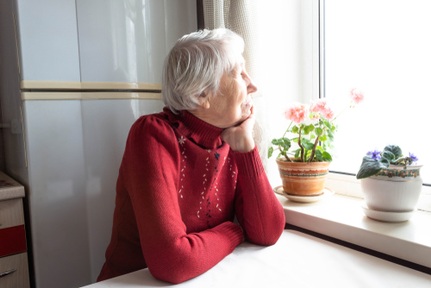World Mental Health Day: Age UK says older people are not 'reaching out' for help
As we mark World Mental Health Day, new figures show three quarters of older people are worried about the cost of living but continue to live with anxiety and depression rather than asking for help.

Mental health has an impact on physical health and vice versa. For example, older adults with physical health conditions such as heart disease have higher rates of depression than those who do not. In addition, untreated depression in an older person with heart disease can negatively affect its outcome.
Age UK has warned older people are continuing to live with anxiety and depression in silence and not “reaching out to get the help they need and deserve”.
Caroline Abrahams, Age UK’s charity director, said: “It’s heart breaking to think that some older people may be experiencing anxiety, depression or severe mental health problems.
“Reaching out for help and talking about mental health and wellbeing is not something most older people have traditionally done, even though it is perfectly normal. We all need help sometimes and feeling depressed or anxious should not be viewed as being an inevitable part of ageing.”
Despite older people making up nearly 20 per cent of the population, NHS data shows, just over five per cent of people over 65 had referrals from NHS talking therapies in 2021/22.
Ms Abrahams said: “Anyone feeling out of sorts for a few weeks should seek help from their GP or a friend or a family member. NHS talking therapies have a higher success rate for older people than younger people, but older people are typically under referred.”
'We can all do our bit to help'
Other data published by the ONS shows 52 per cent of people aged 70 and over were very worried or somewhat worried about the new variants of coronavirus while a third of people aged 70 and over were very worried or somewhat worried about the effects coronavirus is having on their life right now.
“The good news is that we can all do our bit to help though by reaching out to older relatives, and friends for a chat over the phone or a face-to-face visit,” says Ms Abrahams.
“For anyone hard of hearing, a letter may be hugely welcome. For those online, video calls offer a world of opportunities to stay in touch. Simple actions like these can do more good than you will ever know.”
Age UK say it is vital that we all take steps to look after emotional wellbeing.
Some of those steps might include:
• Staying in touch and stay connected. If you are online then keep in touch with friends and family via Skype, or Whats App or by phone or digital messaging.
• Try to do something you enjoy every day and find things that make you laugh, such as humorous movies, books, or online videos. Keep going with hobbies and interests.
• Staying active can help to improve your mood – light exercise or even moving just a little bit more within your own capabilities can help.
• Sign up to Age UK Befriending and Call in Time Services or Silverline services. They offer a reassuring voice and clear information from trained staff on the support available to older people.
• Talk about how you are feeling and if you are struggling to cope with your mental health speak to your GP.
To read our advice section regarding mental health and how to spot the symptoms of mental illness, click here
Latest News
 29-Jul-24
Dementia Bus gives carehome.co.uk staff insight into life with dementia
29-Jul-24
Dementia Bus gives carehome.co.uk staff insight into life with dementia
 27-Jul-23
UK's top home care agencies in 2023 revealed
27-Jul-23
UK's top home care agencies in 2023 revealed
 30-Nov-22
A quarter of older people keep their falls secret from family
30-Nov-22
A quarter of older people keep their falls secret from family
 29-Nov-22
'Covid-19 has not gone away' say terminally ill
29-Nov-22
'Covid-19 has not gone away' say terminally ill
 28-Nov-22
IT consultant who received poor care opens 'compassionate' home care business
28-Nov-22
IT consultant who received poor care opens 'compassionate' home care business